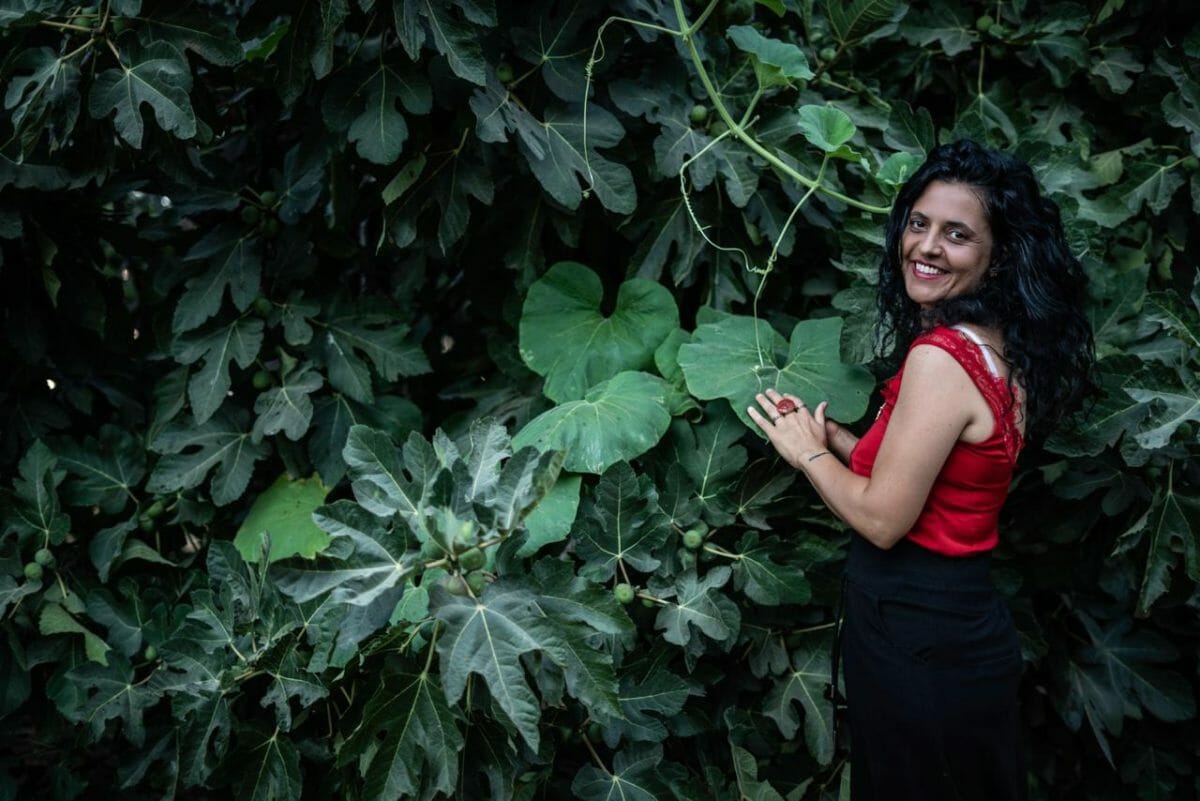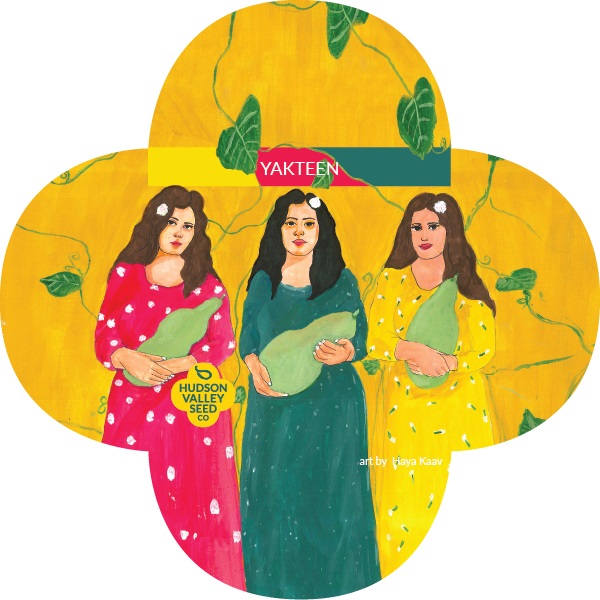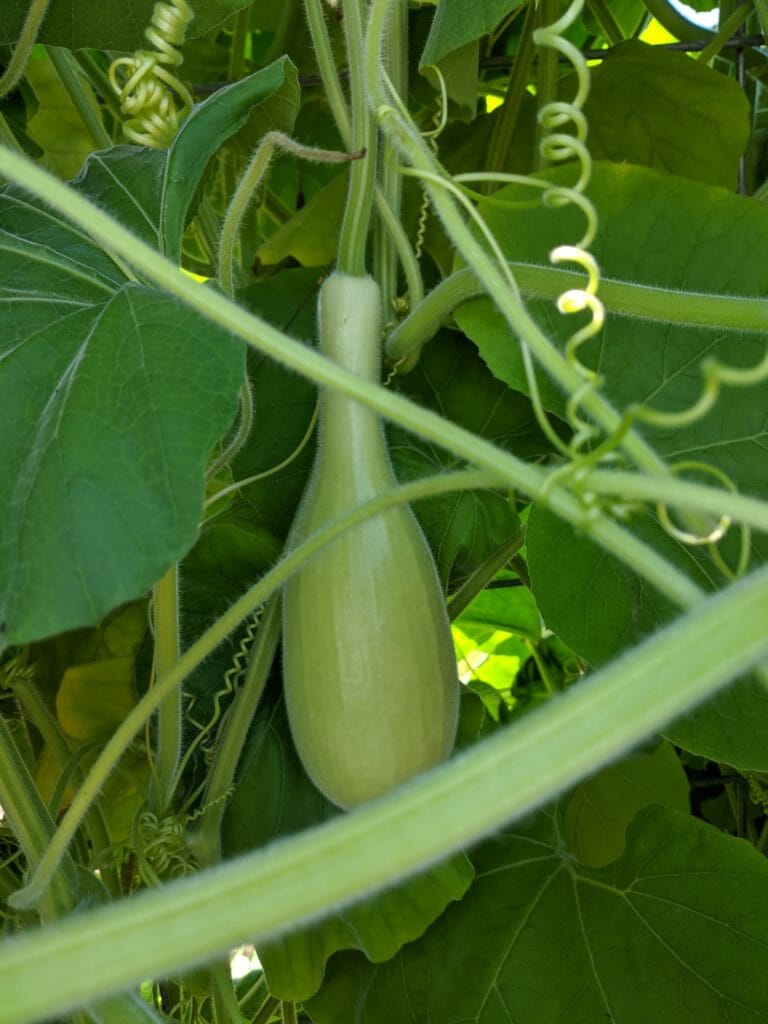Palestinian Seeds Come to America, Stories and Artwork Included
Yakteen is a gourd variety that can be many things at once.
Palestinian Seeds Come to America, Stories and Artwork Included
Yakteen is a gourd variety that can be many things at once.

Vivien Sansour is bringing yakteen to the United States.by Samar Hazboun
Vivien Sansour founded the Palestine Heirloom Seed Library in the West Bank in 2014 as a way to both preserve Palestinian culture at home and to share it with the world. More than a half-decade later, those efforts—and her seeds—have found their way into the American marketplace, specifically in the form of the Hudson Valley Seed Co. seed catalogue. The New York-based company is selling seeds for Sansour’s yakteen gourd, which it believes marks the first time that a Palestinian heirloom variety has been available commercially in the United States.
“These little seeds hold the DNA of my culture—a culture that’s being attacked, eliminated and destroyed,” says Sansour, a Palestinian artist, scholar and conservationist. “And so, when I share it, it becomes literally part of somebody else’s body and psyche. And in this way, we are not alone in our struggle.”
The Hudson Valley Seed Co. and its co-founder, Ken Greene, were in many ways natural partners for Sansour, who was dubbed “The Seed Queen of Palestine” by Al Jazeera back in 2018 when her seed library first started to gain international attention. Greene also runs a non-profit focused on seed justice. His company prides itself on selling unique varieties in a sustainable way and also on telling the story behind each hard-to-find seed.
In addition to the standard growing instructions, the Hudson Valley Seed Co. catalog offers customers information about a seed’s background and—for the lucky varieties—commissions custom artwork for the packaging. It was that particular flourish that first gained Sansour’s notice during a trip to New York several years ago, well before she first met Greene in person. “I went into a gift shop and I saw these beautiful seed packets and was blown away,” she says. “I was like: ‘Who read my mind about how I would like to express my love of nature?’” Sansour and Greene found a young Palestinian artist from Jericho, Haya Kaabneh, to design the seed packets for yakteen.

Yakteen is a gourd, as a literal translation of its Arabic name suggests. But as Sansour and Greene will happily tell you, a gourd is not just a gourd, just as a seed is never simply a seed. Yakteen can be many things over its lifetime and several things at once. When it’s young, the bottle-shaped fruit can be picked and stuffed with rice, lamb and spices; when it’s a little older, you can skin it and sauté it in olive oil. In the summer, the plant’s green vines will climb trees or man-made structures, offering a shaded respite in the heat—be it to those working on a farm in Upstate New York or those walking the streets of Hebron. When the gourds dry out in the fall, they hang like decorative lanterns and can be made into bowl-like vessels or even musical instruments. All the while, Sansour says, the plant serves as an ideal companion to other summer crops such as tomatoes and zucchinis, helping them grow and to keep the soil healthy.
Greene first started experimenting with yakteen on his company’s organic farm last year, and he says he was particularly struck by its fragrant, lace-like white flowers. But like Sansour, his endorsement goes beyond simply the beauty of the plant’s flowers or the taste of its fruit. “Many of us were raised to think about seeds as a commodity,” he says. “What is this going to produce? What’s the yield? You know, what will I get from this? It’s a very extractive way of thinking.”

Instead, Greene prefers to take a broader view of seeds and our relationship to them. “This plant can enrich our lives in terms of our senses and our palates,” he says, “but it can also enrich our lives spiritually and emotionally—it can teach us about new relationships.” He says that, in that spirit, Hudson Valley Seed Co. is taking great care to ensure it is sharing the yakteen in a way that is true to Sansour’s voice and her experience as a Palestinian. “It’s an opportunity for a lot of beauty and joy,” he says. “But it also means not shying away from the difficult parts of those stories.”
Hudson Valley Seed Co. has been selling the seeds for only a few weeks, but Greene says he has already received an influx of enthusiastic emails and social media posts from customers, including Palestinian Americans eager to reconnect with their Palestinian identity. “It’s just been really, really moving that this is so meaningful to people,” he says. “And that’s part of the mission of what we do—to help people connect with seeds in all different ways.”
The early response has Greene and Sansour considering offering additional Palestinian varieties down the road, but they seem to be approaching those decisions in the same careful, deliberate way they did their initial one. In particular, they want to ensure that any future offerings can flourish in an American climate the same way as yakteen. “It feeds into the global question that we all are asking ourselves today, which is how to design a better food future, [one] that is truly sustainable, not just saying ‘sustainable’ for the sake of the fancy word,” says Sansour. “It is going to require experimentation, trial and error, and a commitment to relationships—to all living beings, soil and seeds included.”
Follow us
This work is licensed under a Creative Commons Attribution-NoDerivatives 4.0 International License.
Want to republish a Modern Farmer story?
We are happy for Modern Farmer stories to be shared, and encourage you to republish our articles for your audience. When doing so, we ask that you follow these guidelines:
Please credit us and our writers
For the author byline, please use “Author Name, Modern Farmer.” At the top of our stories, if on the web, please include this text and link: “This story was originally published by Modern Farmer.”
Please make sure to include a link back to either our home page or the article URL.
At the bottom of the story, please include the following text:
“Modern Farmer is a nonprofit initiative dedicated to raising awareness and catalyzing action at the intersection of food, agriculture, and society. Read more at <link>Modern Farmer</link>.”
Use our widget
We’d like to be able to track our stories, so we ask that if you republish our content, you do so using our widget (located on the left hand side of the article). The HTML code has a built-in tracker that tells us the data and domain where the story was published, as well as view counts.
Check the image requirements
It’s your responsibility to confirm you're licensed to republish images in our articles. Some images, such as those from commercial providers, don't allow their images to be republished without permission or payment. Copyright terms are generally listed in the image caption and attribution. You are welcome to omit our images or substitute with your own. Charts and interactive graphics follow the same rules.
Don’t change too much. Or, ask us first.
Articles must be republished in their entirety. It’s okay to change references to time (“today” to “yesterday”) or location (“Iowa City, IA” to “here”). But please keep everything else the same.
If you feel strongly that a more material edit needs to be made, get in touch with us at [email protected]. We’re happy to discuss it with the original author, but we must have prior approval for changes before publication.
Special cases
Extracts. You may run the first few lines or paragraphs of the article and then say: “Read the full article at Modern Farmer” with a link back to the original article.
Quotes. You may quote authors provided you include a link back to the article URL.
Translations. These require writer approval. To inquire about translation of a Modern Farmer article, contact us at [email protected]
Signed consent / copyright release forms. These are not required, provided you are following these guidelines.
Print. Articles can be republished in print under these same rules, with the exception that you do not need to include the links.
Tag us
When sharing the story on social media, please tag us using the following: - Twitter (@ModFarm) - Facebook (@ModernFarmerMedia) - Instagram (@modfarm)
Use our content respectfully
Modern Farmer is a nonprofit and as such we share our content for free and in good faith in order to reach new audiences. Respectfully,
No selling ads against our stories. It’s okay to put our stories on pages with ads.
Don’t republish our material wholesale, or automatically; you need to select stories to be republished individually.
You have no rights to sell, license, syndicate, or otherwise represent yourself as the authorized owner of our material to any third parties. This means that you cannot actively publish or submit our work for syndication to third party platforms or apps like Apple News or Google News. We understand that publishers cannot fully control when certain third parties automatically summarize or crawl content from publishers’ own sites.
Keep in touch
We want to hear from you if you love Modern Farmer content, have a collaboration idea, or anything else to share. As a nonprofit outlet, we work in service of our community and are always open to comments, feedback, and ideas. Contact us at [email protected].by Josh Voorhees, Modern Farmer
February 20, 2021
Modern Farmer Weekly
Solutions Hub
Innovations, ideas and inspiration. Actionable solutions for a resilient food system.
ExploreExplore other topics
Share With Us
We want to hear from Modern Farmer readers who have thoughtful commentary, actionable solutions, or helpful ideas to share.
SubmitNecessary cookies are absolutely essential for the website to function properly. This category only includes cookies that ensures basic functionalities and security features of the website. These cookies do not store any personal information.
Any cookies that may not be particularly necessary for the website to function and are used specifically to collect user personal data via analytics, ads, other embedded contents are termed as non-necessary cookies.
This is great! I remember eating them as a kid in the occupied West Bank. They are a delicious squash when picked small and stuffed. Just wish I could buy some seeds. The site is already sold out!
WOW!!! I am so excited to grow Yakteen in my garden. They are delicious stuffed with rice and meat, a traditional Palestinian dish. Thank you for sharing the beautiful Palestinian culture and keeping it alive. May your efforts be blessed abundantly.
Just how invasive is this new gord kufzu going to be?